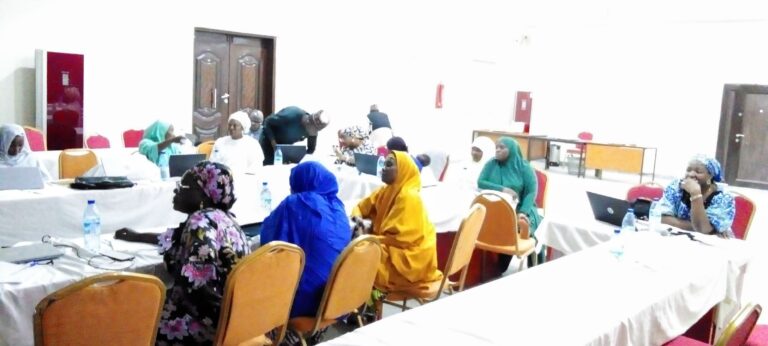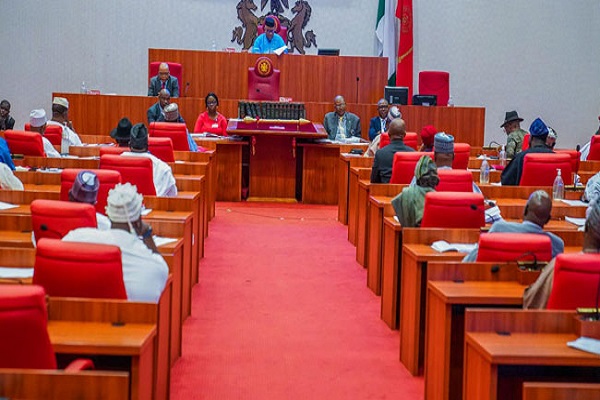News
Kaduna Perm. Sec. urges LG focal persons to improve responsibilities for better nutrition indices

Mr Bashir Muhammad, the Permanent Secretary, Kaduna State Planning and Budget Commission (PBC), has urged Local Government Area
(LGA) Nutrition Focal Persons (NFPs) to improve their responsibilities for better nutrition indices in the state.
Muhammad, who doubles as the Chairman of the State Committee on Food and Nutrition (SCFN), made the call in Zaria, Kaduna State, at the opening of a three-day quarterly review meeting of NFPs across the state’s LGAs.
Muhammad, represented by the Director, Development Aid Coordination, PBC, Mrs Linda Yakubu, decried the poor outcome of the last meeting held with the local government NFPs .
“We felt discouraged to the point of contemplating to hold another meeting, but due to your importance in ensuring the set objectives in improving nutrition, we organised this quarterly review meeting,” he said.
He noted that the NFPs were saddled with the responsibility of ensuring that all nutrition interventions in LGAs were implemented under the PBC’s watch.
The SCFN chairman also noted that the committee was saddled with responsibility of ensuring that whatever was contained in the Kaduna State Multi-Sectoral Plan of Action on nutrition, should also be implemented at LGA levels.
He, therefore, said the review meeting was to interact with the LGAs NFPs to hear what they were doing in the various LGAs in line with the nutrition action plan.
He urged the LGAs NFPs to improve, going forward to reflect what they ought to have developed as their Annual Operation Plan, which would be reviewed in the meeting as a supposed guide for their activities in the last two quarters.
Earlier, the Director, Development Aid Coordination, PBC, Mrs Linda Yakubu, said the essence of the meeting was to review the Annual Operational Plan for the 23 LGAs in Kaduna.
Yakubu, represented by Ms Hauwa Baba, said the meeting was also to review updates on implementation of the annual operational plan and build capacity of the NFPs on appraisal tool.
A supporting partner of the meeting, Jessica Bartholomew, the State Coordinator of Civil Society Scaling Up Nutrition in Nigeria (CS-SUNN), commended the PBC for ensuring implementation of their mandate.
She explained that, in spite of numerous challenges such as cash backing and other government protocols, the SCFN had been appraised of its task towards ensuring that the needful was done by the NFPs, to enhance nutrition.
Another supporting partner, Rahila Maishanu, representative of NAFDAC, congratulated the SCFN for the feat it had achieved in enhancing nutrition indices.
In comparison with other states across Nigeria, she said better nutrition indices in Kaduna superceded many states in Nigeria.
Also, Muhammad Madaki, the Zonal Coordinator (Zone 1) of the State Primary Health Care Board, noted that such review meetings was critical to improving nutrition indices.
On behalf of other Zonal Coordinators (2 and 3), he said the NFPs were key to the success of the SCFN.
He urged the NFPs to be deligent in implementing the nutrition action plan however the numerous challenges, including finance.
The review meeting was also supported by UNICEF, among others.
Headline
Prince Harry visits sick Nigerian soldiers in Kaduna

Prince Harry and his team visited the 44 Nigerian Army Reference Hospital in Kaduna to interact with wounded soldiers who are receiving treatment.
The Duke of Sussex is in Nigeria with his wife to champion the Invictus Games, which Harry founded to aid the rehabilitation of wounded and sick servicemembers and veterans.
Nigeria joined the Invictus Community of Nations in 2022 becoming the first African country to join.
Prince Harry’s visit to Kaduna came 68 years after his late grandmother Queen Elizabeth II visited the state during the time of the late Premier of Northern Region Sir Ahmadu Bello.




News
Senate approves death penalty for drug traffickers

Senate on Thursday, May 9, approved the death penalty for those convicted on the charge of drug trafficking in the country.
The punishment prescribed in the extant NDLEA Act is a maximum sentence of life imprisonment.
The resolution of the Senate followed its consideration of a report of the Committees on Judiciary, Human Rights and Legal Matters and Drugs and Narcotics, National Drug Law Enforcement Agency (NDLEA) Act (Amendment) Bill, 2024.
The Chairman of the Committee on Judiciary, Human Rights & Legal Matters presented the report during plenary, Senator Mohammed Monguno (APC-Borno North).
The bill, which passed its third reading, aims to update the list of dangerous drugs, strengthen the operations of the NDLEA, review penalties, and empower the establishment of laboratories.
Section 11 of the current act prescribes that “any person who, without lawful authority; imports, manufactures, produces, processes, plants or grows the drugs popularly known as cocaine, LSD, heroin or any other similar drugs shall be guilty of an offence and liable on conviction to be sentenced to imprisonment for life” was amended to reflect a stiffer penalty of death.
Although the report did not recommend a death penalty for the offence, during consideration, Senator Ali Ndume moved that the life sentence should be upgraded to the death penalty.
During a clause-by-clause consideration of the Bill, Deputy Senate President Barau Jibrin, who presided over the session, put the amendment on the death penalty to a voice vote and ruled that the “ayes” had it.
But Senator Adams Oshiomhole objected to the ruling, saying that the “nays” had it.
He argued that matters of life and death should not be treated hurriedly, but Barau said it was too late, as he failed to call for division immediately after his ruling.
The bill was subsequently read for the third time and passed by the Senate.
-

 Business6 days ago
Business6 days agoNigeria needs over $2bn to revive Ajaokuta Steel Plant, says Minister
-

 Headline6 days ago
Headline6 days agoSuspend cybersecurity levy– Reps to CBN
-

 Headline4 days ago
Headline4 days agoPrince Harry visits sick Nigerian soldiers in Kaduna
-

 Entertainment4 days ago
Entertainment4 days agoAMVCA Cultural Day: BBNaija’s Neo, Venita win Best Dressed Male, Female
-

 Headline6 days ago
Headline6 days agoTinubu resumes work after foreign trip
-

 News6 days ago
News6 days agoShan George’s money returned to Zenith Bank account
-

 Metro4 days ago
Metro4 days agoEx-Sports Minister laments after hospital neglected him for hours over N80000 deposit



